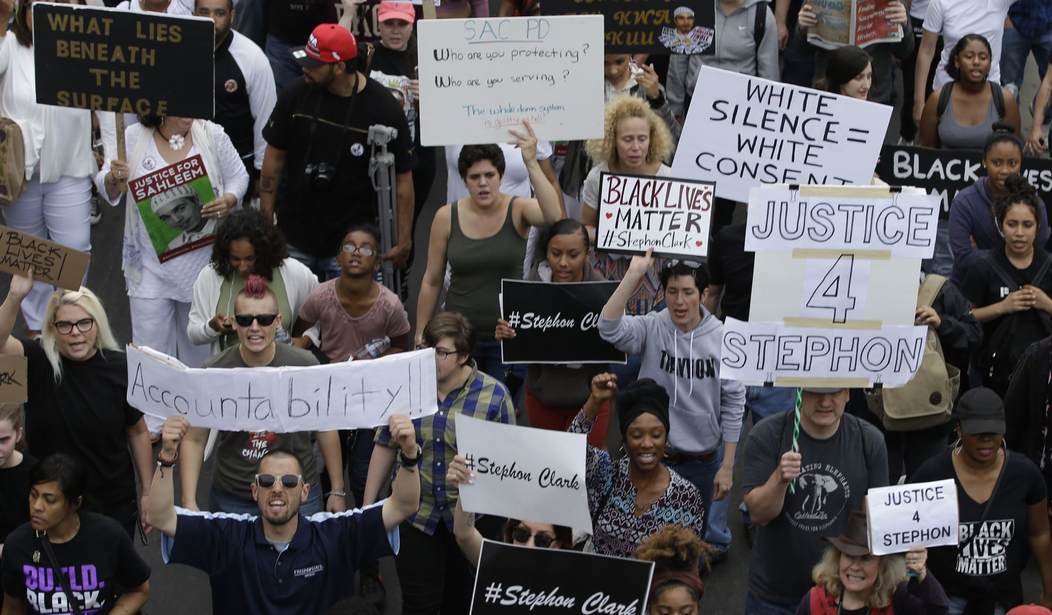Despite continued reductions in law enforcement officers’ use of deadly force, this decade is shaping up to be one of the most trying decades in the history of American law enforcement. The debate surrounding the state of policing is dominated by emotion rather than fact. The amount of demagoguery and invective in the national discussion of law enforcement should concern everyone, because effective policing and, in turn, a safe citizenry rely on factual and objective reporting. The police-involved shooting death of Stephon Clark in Sacramento, California last year is just the latest example of how facts tend to get hijacked when it comes to controversial police actions.
Hours after a Ferguson, Missouri police officer shot and killed Michael Brown, the “hands up, don’t shoot” narrative had begun to take shape. Across the country, Ferguson police officer Darren Wilson’s presumption of innocence was bulldozed by rumors that Michael Brown was in the process of peacefully surrendering when shot by Ferguson police officer Darren Wilson. In the ensuing days, Ferguson would be torn apart by riots and destruction. Professional athletes, celebrities, members of Congress, and even news commentators completely bought into the “hands up, don’t shoot” narrative. They ignored evidence that Brown had just robbed a convenience store, assaulted and attempted to disarm Officer Wilson.
In March 2015, the Department of Justice issued its official findings that Wilson’s use of deadly force was reasonable and lawful. It didn’t matter; the damage was done. To this day, Michael Brown’s name is synonymous with the false narrative his death spawned.
To the extent these wounds had begun to heal in the four years since, raw nerves were again laid bare in the recent coverage of the shooting death of Stephon Clark in Sacramento, California. Sadly, as in the Brown case, the events which led to the death of Clark have been misrepresented by special interest groups and many media outlets.
Clark, a black man, was shot by two Sacramento police officers after he took a shooting stance and pointed what turned out to be a cell phone at the officers. In the dark, the phone appeared to be a gun and both officers, one black and one white, fired at Clark, killing him.
Recommended
The investigation found that Clark had recently sent text messages expressing suicidal thoughts. His actions during the confrontation with officers appeared to be an intentional provocation of deadly force, fueled by alcohol, cocaine, and opioids – a “suicide by cop.” To their credit, both the Sacramento District Attorney and California Attorney General declined to bring charges against the officers, citing the reasonableness of their actions. But despite its nuances, the case is still widely described in the headlines by a familiar, inflammatory shorthand: “unarmed black man shot by police.”
Now, in direct response to the Stephon Clark case, the California legislature is considering a bill that would endanger public safety by restricting officers’ ability to protect lives, including their own. Assembly Bill 392 is a significant and intentional departure from the longstanding constitutional standards officers have operated under for decades. Among other things, this new standard would require officers to give distance and space to individuals, even those who are armed or believed to be armed and dangerous, in order to avoid having to use force. Failure of an officers to do so would subject them to criminal charges but adhering to these limitations will jeopardize officer and public safety.
Law enforcement has a vital role protecting members of the public in communities across the country. We should all work to support efforts by law enforcement to reduce the necessity of deadly force. But we must not continue to accept false and incendiary narratives which work to further polarize an already divisive issue. The men and women of law enforcement must retain the right to use reasonable force to protect themselves and us. We must not allow politically-driven false narratives to continue to drive public policy, to the detriment of public safety.
























Join the conversation as a VIP Member